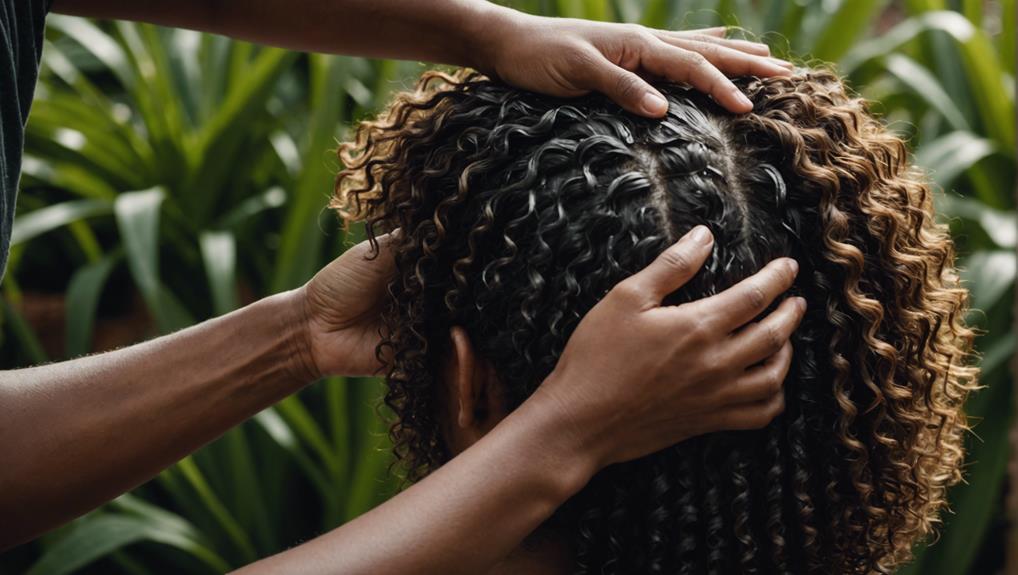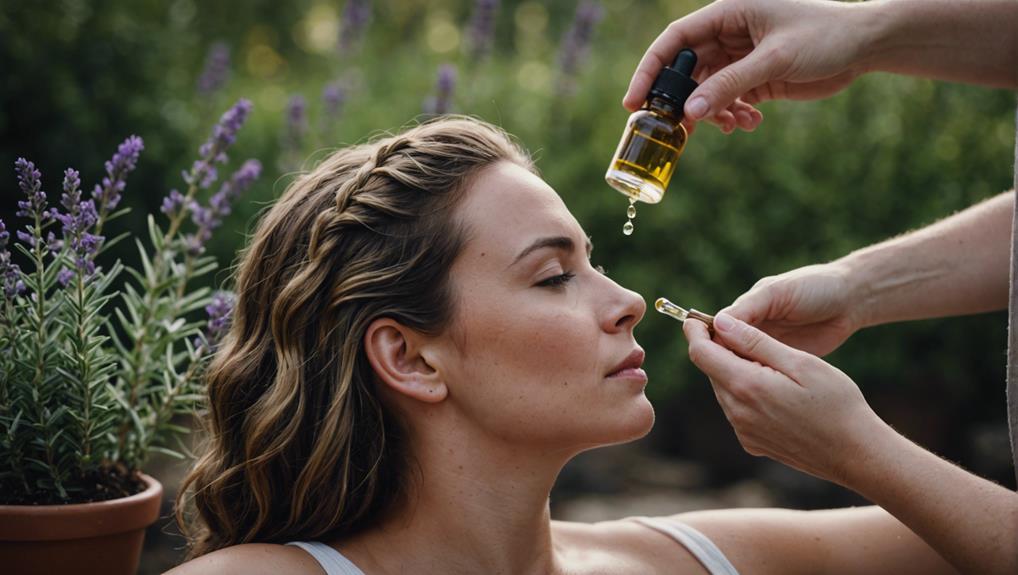Achieving healthy, vibrant hair naturally involves several key steps. Select shampoos free of sulfates and parabens and prioritize organic ingredients. Regular conditioning, including deep conditioning, helps nourish and detangle the hair. Incorporate essential oils like jojoba or rosemary to promote scalp health and hair growth. Limit heat styling and opt for air drying when possible. Protective styles, such as braids or buns, reduce breakage and heat damage. Exfoliate and hydrate your scalp regularly, and maintain a balanced diet rich in proteins, vitamins, and omega-3 fatty acids. To discover more essential practices for healthy locks, continue exploring.
Key Takeaways
- Choose shampoos with organic ingredients, avoiding sulfates and parabens, to maintain moisture and reduce damage.
- Incorporate regular conditioning and deep conditioning for intense hydration and repair.
- Use essential oils to nourish the scalp, promote hair growth, and address concerns like dandruff.
- Limit heat styling, use heat protectants, and embrace air drying to minimize damage.
- Maintain a balanced diet rich in protein, omega-3 fatty acids, vitamins, and minerals for optimal hair health.
Choose the Right Shampoo

Choosing the right shampoo is crucial for maintaining the health and vibrancy of natural hair. With numerous options available, it can be overwhelming to select the best product. Prioritizing shampoos with organic ingredients can make a significant difference. Organic ingredients are less likely to strip the hair of its natural oils, maintaining moisture and reducing the risk of damage. They are free from harsh chemicals such as sulfates and parabens, which can be harmful to natural hair.
Understanding shampoo frequency is also important. Washing hair too often can cause dryness and breakage by stripping away essential oils. Conversely, not washing frequently enough can lead to product build-up and scalp issues. Striking the right balance is key. For most people with natural hair, shampooing once a week is typically sufficient, although this may vary based on individual hair needs and lifestyle.
Condition Regularly
Maintaining natural hair health involves more than just shampooing; regular conditioning is equally crucial. Conditioning provides essential moisture and nutrients, keeping your hair soft, strong, and easier to manage. It helps detangle hair, making styling simpler and preventing breakage and split ends.
Deep conditioning is particularly vital for natural hair. These treatments penetrate the hair shaft, offering intense hydration and repairing damage, which makes your hair more resilient. Aim to deep condition at least once a week using a product specifically formulated for deep conditioning to achieve the best results.
Protein treatments are also essential. Hair is primarily made of keratin, a type of protein that can degrade over time, leading to weak and brittle hair. Protein treatments help rebuild and strengthen the hair shaft, maintaining its structure and elasticity. Incorporate a protein treatment into your routine every four to six weeks to reduce the risk of breakage.
Use Essential Oils

Essential oils can significantly enhance the health and appearance of natural hair. These concentrated plant extracts offer numerous benefits, such as nourishing the scalp, promoting hair growth, and adding shine. Popular choices include lavender, rosemary, and peppermint oils, known for their rejuvenating and soothing properties.
Incorporating essential oils into your hair care routine also provides aromatherapy benefits. The calming scents can reduce stress and improve overall well-being. Essential oils can address specific hair concerns like dandruff, dryness, and hair thinning. For instance, tea tree oil can combat dandruff, while argan oil is excellent for dry hair.
Customizing your hair care by blending essential oils allows you to target multiple concerns simultaneously. Mixing a few drops of essential oil with a carrier oil like coconut or jojoba oil can create an effective treatment. This mixture can be massaged into the scalp or used as a hair mask. Regular use of essential oils can lead to healthier, more vibrant hair. Always perform a patch test to ensure there are no adverse reactions.
Limit Heat Styling
Limiting heat styling is essential to maintaining healthy hair. Always use heat protectants to minimize damage when you must use styling tools. Whenever possible, embrace air drying to reduce stress on your hair.
Use Heat Protectants
Using heat protectants is essential for safeguarding natural hair from the damaging effects of styling tools. Thermal sprays and heat shields form a protective layer between your hair and the high temperatures of devices like blow-dryers, straighteners, and curling irons. These products help minimize hair breakage, split ends, and moisture loss.
Thermal sprays coat each hair strand with a thin protective layer, reducing direct heat contact and helping to preserve your hair's natural integrity. Heat shields are typically applied before using blow-dryers, straighteners, or curling irons, reducing heat transfer and keeping your hair healthy and strong.
For maximum effectiveness, ensure your hair is evenly coated with the protectant. Apply the product from root to tip and use a comb to distribute it evenly, ensuring every strand is protected.
Additionally, limit the frequency of heat styling to allow your hair to recover between sessions. Always use the lowest heat setting necessary to achieve your desired look. By following these steps, you can maintain healthy, resilient hair while enjoying a variety of styles.
Embrace Air Drying
Air drying your hair can significantly reduce heat damage and promote healthier strands. Limiting the use of heat styling tools like blow dryers, flat irons, and curling wands allows your hair to recover. Heat weakens the hair shaft, leading to breakage and split ends. Opting for natural drying methods helps maintain your hair's natural moisture and strength.
Begin by gently patting your hair with microfiber towels, which are less abrasive than regular cotton towels and help reduce frizz and breakage. Microfiber towels absorb water more efficiently, cutting down the time your hair needs to air dry.
After using a microfiber towel, let your hair dry naturally. Avoid brushing wet hair, as it is more prone to breakage. Instead, use a wide-tooth comb to detangle gently. You can also apply leave-in conditioners or natural oils to keep your hair hydrated and manageable during the drying process.
Incorporating air drying into your hair care routine can make a significant difference. It minimizes damage, preserves your hair's natural texture, and promotes overall hair health. Embrace air drying for stronger, shinier locks.
Embrace Protective Styles

Embracing protective styles can greatly benefit your natural hair care routine. These styles help reduce hair breakage, minimize heat damage, and promote hair growth. By choosing protective styles, you can maintain healthy hair while achieving your desired look.
Reduce Hair Breakage
Incorporating protective styles into your hair care routine can greatly reduce breakage. Styles such as braids, twists, and buns shield your hair from environmental stressors and minimize handling, thereby reducing the chance of breakage.
One essential tip is to practice gentle detangling. Use a wide-tooth comb or your fingers to remove knots and tangles, minimizing the risk of snapping your hair strands. Additionally, sleeping on silk pillowcases can make a significant difference, as silk creates less friction compared to cotton, helping prevent hair breakage during sleep.
Another strategy is to keep your hair moisturized, as dry hair is more prone to breaking. Apply leave-in conditioners and oils to maintain hydration. Also, avoid tight hairstyles that cause tension on the scalp and hairline.
Below is a table summarizing key tips for reducing hair breakage:
| Tip | Benefit | Tools Needed |
|---|---|---|
| Gentle Detangling | Reduces hair snapping | Wide-tooth comb, fingers |
| Silk Pillowcases | Minimizes friction during sleep | Silk pillowcase |
| Moisturizing Products | Keeps hair hydrated | Leave-in conditioner, oils |
Minimize Heat Damage
Minimize Heat Damage
To protect your hair from damage, it is essential to minimize the use of heat styling tools, which can weaken the hair shaft, leading to breakage and split ends. Instead, opt for natural drying methods and embrace protective styles to maintain your hair's health.
Consider the following tips to minimize heat damage:
- Use Cooling Tools: Choose hair dryers and styling tools with a cool air setting to reduce the temperature applied to your hair, thereby minimizing damage.
- Thermal Caps: When deep conditioning, use thermal caps to help the conditioner penetrate better without needing high heat.
- Protective Styles: Embrace styles like braids, twists, or buns to reduce the frequency of heat styling and protect the hair ends from environmental damage.
- Air Drying: Whenever possible, let your hair dry naturally. Pat it gently with a towel and let it air dry to avoid the intense heat from blow dryers.
Promote Hair Growth
Protective styles are effective in promoting hair growth by minimizing breakage and retaining length. Styles like braids, twists, and buns shield the hair from everyday wear and tear, reducing exposure to environmental factors and mechanical damage. This allows your hair to grow longer and stronger.
Incorporating scalp massage techniques into your hair care routine can further enhance hair growth. Regular scalp massages increase blood flow to the hair follicles, delivering essential nutrients that promote growth. You can use your fingertips or a specialized scalp massager for this purpose.
Herbal supplements, such as biotin, saw palmetto, and horsetail extract, also support hair health. These supplements provide essential nutrients that strengthen hair strands and encourage growth. Adding these natural remedies to your hair care regimen can provide necessary support from within.
Balancing protective styles with proper care techniques is key. Keep your hair moisturized and avoid tight styles that can cause tension. With the right approach, protective styles, massage techniques, and herbal supplements can work together to promote healthy, long-lasting hair growth.
Trim Split Ends
Keep Your Natural Hair Healthy and Vibrant with Regular Trimming
To maintain healthy and vibrant natural hair, regular trimming is essential. Frequent trims help manage and prevent split ends, which can make your hair look frizzy and unhealthy. By removing damaged ends, you enable your hair to retain its strength and shine.
Split ends occur when the protective outer layer of the hair cuticle wears away due to stress, heat, or chemical treatments. Once split ends form, they can travel up the hair shaft, causing further damage. By scheduling trims every 6-8 weeks, you can prevent this problem, ensuring a healthier overall appearance.
Key Benefits of Trimming Split Ends:
- Prevents Breakage: Regular trims remove weak and damaged ends, reducing the risk of hair breakage.
- Preserves Length: While trimming doesn't make hair grow faster, it prevents split ends from traveling up the shaft, thus preserving length.
- Improves Texture: Cutting off damaged ends results in smoother, less tangled hair.
- Maintains Shape: Frequent trims help maintain the shape and style of your hair, making it more manageable.
Scalp Care Routine

Maintaining a healthy scalp is essential for vibrant, natural hair. Regular scalp exfoliation, hydrating treatments, and a balanced diet all play key roles. These practices can help prevent issues like dryness, flakiness, and hair loss.
Regular Scalp Exfoliation
How often do you consider the importance of regular scalp exfoliation in your hair care routine? Exfoliating your scalp is crucial for maintaining healthy hair. It removes dead skin cells and promotes scalp circulation, which can lead to stronger hair growth and a healthier scalp environment.
Regular scalp exfoliation offers several key benefits:
- Improves Scalp Circulation: Using gentle scrubs or exfoliating brushes enhances blood flow to the scalp. This increased circulation nourishes hair follicles, supporting hair growth.
- Removes Dead Skin: Dead skin cells accumulate on the scalp over time. Exfoliation clears these cells, reducing dandruff and other scalp issues.
- Unclogs Hair Follicles: Product buildup and excess oil can block hair follicles. Exfoliating opens these follicles, allowing hair to grow freely and reducing hair thinning.
- Enhances Product Absorption: A clean scalp better absorbs hair care products. This ensures that treatments and conditioners penetrate deeply, making them more effective.
Incorporating scalp exfoliation into your routine is simple. Use a gentle scrub once a week. Opt for natural ingredients like sugar or salt mixed with essential oils for an effective yet gentle exfoliation experience. Proper scalp care lays the foundation for healthy, vibrant hair.
Hydrating Scalp Treatments
Hydrating scalp treatments are vital for maintaining moisture balance and preventing dryness. These treatments nourish the scalp, enhance hair health, and alleviate issues like flakiness and itching. One of the best natural ingredients for this purpose is aloe vera. Rich in vitamins and minerals, aloe vera hydrates and soothes the scalp while its anti-inflammatory properties help reduce irritation.
Incorporating scalp masks into your routine can significantly improve scalp hydration. These masks provide deep conditioning and moisture, often containing ingredients like aloe vera to lock in hydration and promote a healthy scalp environment. To use a scalp mask, apply it directly to your scalp, leave it on for the recommended time, and rinse thoroughly. Using a scalp mask once a week can make a noticeable difference in scalp health.
Regular hydrating treatments are essential for maintaining a healthy scalp and beautiful hair. By integrating aloe vera and scalp masks into your routine, you can ensure your scalp remains nourished and hydrated.
Balanced Diet Impact
A balanced diet is crucial for maintaining a healthy scalp and promoting strong hair growth. Proper nutrient absorption ensures that your hair receives the essential vitamins and minerals it needs. Without these nutrients, the scalp can become dry and flaky, leading to breakage-prone hair.
To prevent vitamin deficiency and ensure a healthy scalp, consider the following dietary recommendations:
- Protein-Rich Foods: Hair is primarily composed of protein. Consuming adequate amounts of protein-rich foods, such as eggs, lean meats, and legumes, strengthens hair strands.
- Omega-3 Fatty Acids: Found in fish, flaxseeds, and walnuts, omega-3 fatty acids help keep the scalp hydrated and reduce inflammation.
- Vitamins and Minerals: Vitamins A, C, D, and E, along with minerals like zinc and iron, are vital for hair health. These can be sourced from fruits, vegetables, nuts, and whole grains.
- Hydration: Drinking plenty of water ensures that the scalp and hair follicles remain hydrated, facilitating better nutrient absorption.
Incorporating these elements into your diet can significantly impact your scalp care routine. By addressing nutrient absorption and preventing vitamin deficiency, you can achieve healthier, more resilient hair.
Eat a Balanced Diet
Eat a Balanced Diet for Healthy Hair
Maintaining a balanced diet is crucial for promoting healthy hair growth and overall scalp wellness. Nutrient absorption plays a key role in ensuring your hair receives the essential vitamins and minerals to remain strong and vibrant. While vitamin supplements can be beneficial, obtaining nutrients from whole foods is more effective.
A diet rich in fruits, vegetables, lean proteins, and healthy fats provides the necessary nutrients for optimal hair health. Omega-3 fatty acids, found in fish and flaxseeds, support scalp health. Iron, present in spinach and lentils, enhances blood circulation to the scalp, promoting hair growth. Vitamin C, found in citrus fruits, aids in collagen production, which strengthens hair strands.
Here's a quick guide to essential nutrients and their food sources:
| Nutrient | Benefits | Food Sources |
|---|---|---|
| Omega-3 Fatty Acids | Supports scalp health | Fish, Flaxseeds |
| Iron | Enhances blood circulation | Spinach, Lentils |
| Vitamin C | Boosts collagen production | Citrus Fruits, Berries |
Incorporate these nutrient-rich foods into your daily diet for optimal hair health. Remember, a balanced diet not only supports your hair but also enhances your overall well-being. Consistent consumption of these foods can lead to long-term benefits.
Avoid Tight Hairstyles

Avoiding tight hairstyles is crucial for preventing hair damage and maintaining healthy strands. When hair is pulled too tightly, it creates tension and places unnecessary stress on the follicles, leading to breakage, thinning, and, in severe cases, traction alopecia. Ensuring that hairstyles are not too tight helps maintain the overall health and strength of your hair.
Here are some tips to avoid tight hairstyles:
- Opt for Loose Styles: Choose hairstyles that don't pull on your hair, such as loose braids, buns, or ponytails.
- Use Soft Hair Ties: Avoid elastic bands that can cause breakage. Instead, use fabric-covered ties or scrunchies.
- Change Up Your Style: Regularly changing your hairstyle can reduce constant stress on the same areas of your scalp.
- Listen to Your Scalp: If you feel pain or discomfort, it's a sign that your hairstyle is too tight. Adjust or loosen it immediately.
Stay Hydrated
Proper hydration is essential for maintaining healthy and vibrant hair. Drinking enough water daily ensures your hair remains strong and looks lively. Hydration levels in your body directly affect your hair's condition.
When you're well-hydrated, your scalp retains moisture, preventing dryness and reducing dandruff risk. Hydrated hair is less prone to breakage, resulting in fewer split ends and reduced hair loss. Water transports essential nutrients to your hair follicles, promoting growth and strength.
Hydration benefits extend beyond the scalp and hair strands. Adequate water intake improves the overall structure of each hair strand, making it more resilient to damage, reducing frizz, and creating a smoother texture. It also helps maintain your hair's natural shine, giving it a healthy appearance.
To achieve these benefits, aim to drink at least eight glasses of water daily, adjusting based on your activity level and climate. Staying hydrated is a simple yet powerful way to keep your hair looking its best.
Frequently Asked Questions
How Can I Reduce Frizz in Humid Weather?
To reduce frizz in humid weather, start by using a leave-in conditioner. This helps to lock in moisture and create a protective barrier. Additionally, utilize humidity blockers to shield your hair from excess moisture in the air. These products can smooth the hair cuticle, preventing frizz. Regularly trimming your hair to remove split ends can also contribute to a sleeker appearance in humid conditions.
What Are the Benefits of Sleeping on a Silk Pillowcase?
While cotton pillowcases can cause hair friction, silk pillowcases offer a smooth surface that reduces hair breakage. This juxtaposition highlights the benefits of sleeping on a silk pillowcase. The silk fabric minimizes tangles and split ends, ensuring your hair remains healthier. Additionally, silk pillowcases retain less moisture, helping to maintain your hair's natural oils. This ultimately leads to shinier, more manageable hair upon waking.
How Often Should I Exfoliate My Scalp?
Exfoliating your scalp is essential for removing dead skin cells and promoting healthy hair growth. Generally, you should exfoliate your scalp once a week. Using scalp massagers or exfoliating brushes can enhance the effectiveness of this routine. These tools improve blood circulation and guarantee a thorough cleanse. However, individuals with sensitive scalps may need to exfoliate less frequently to avoid irritation. Always listen to your scalp's needs.
Can Stress Affect the Health of My Hair?
Yes, stress can affect the health of your hair. Elevated stress hormones, like cortisol, can disrupt the hair growth cycle. This disruption can lead to hair thinning or even hair loss. Prolonged stress can weaken hair follicles, making them more prone to damage. Managing stress through relaxation techniques, exercise, and proper nutrition can help maintain healthy hair and reduce the risk of hair thinning.
What Are the Best Natural Remedies for Dandruff?
Banishing dandruff can feel like chasing away a persistent shadow. Natural remedies like apple cider vinegar and tea tree oil are highly effective. Apple cider vinegar restores the scalp's pH balance, reducing yeast growth. Tea tree oil, known for its antifungal properties, helps eliminate dandruff-causing microbes. Apply diluted apple cider vinegar or tea tree oil to the scalp, leave for a few minutes, then rinse thoroughly.
Conclusion
Healthy hair can be maintained by following natural care practices. Using the right shampoo and conditioning regularly are foundational steps. Essential oils and protective styles help preserve hair integrity. Limiting heat styling prevents damage, similar to how avoiding overexposure to the sun protects the skin. A balanced diet and adequate hydration nourish hair from within. Proper scalp care and avoiding tight hairstyles further guarantee that hair remains strong and vibrant.

